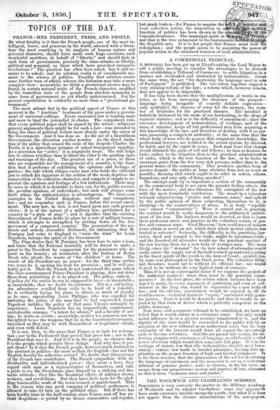TOPICS OF THE DAY.
The most salient fact in the political aspect of France at this moment is the "Austrian" treatment of the press under a govern- ment of universal suffrage. Every successive law is tending more and more to bind the journalist in chains. The compulsory rule, that every political paper shall be signed by the writer—whatever . general arguments there might be for such a law—was intended to bring the class of political writers more closely under the screw of the Government. And it has done so. As the act of a,Republican Government, the alteration excites wonder. As the direct imita- tion of the policy that caused the exile of the despotic Charles the Tenth, it is a marvellous instance of naked transparent impolicy. As a provision for " order," it is singularly inept. The rule helps less to silence rebellion than to blind the ruler to the guiding signs and warnings of the day. The greatest use of -a press, to those who are responsible for the management of a country, is the func- tion that it performs of exhibiting the opinions and feelings of parties : the rule which obliges every man who holds the editorial pen to attach his signature to his section of the work, deprives the composition of its collective character, and compels it simply to re- present the opinions and feelings of a few individuals. There may be eases in which it is desirable to have out, for the public service, the peculiar opinions of individuals ; but such will always come 'forth where the authentication is advantageous. We have seen examples in the United Kingdom, without an compulsory law ; and We remember such _in. France, before the recent enact- ment. The new law, in feet, is not based upon any such general views : it is of the nature of, a _military law, proclaimed for a country in " a state of siege " ; and it signifies that the existing
Government of holds its place by a sort of military tenure, which it attempts to strengthen by putting down all the free movement of .a conquered country. The prosecution of the mo- .derate and orderly Assernblee'Nationale,, for intimating that M. Bersigny had come to England to '( raise the wind" for Louis Napoleon, betrays the spirit of the Government.
The Pays denies that. M. Persigny has been here to raise a loan, and hints that the National Assembly will be forced to make a grant to the President by compassion for the pensioners who de- pend on his bounty; .an intimation after the fashion of 'Robin Hood, who pleads the wants of "his children" at home. The wants of the President are no secret : for the third time within two years he is opening his beak for provision ; and he will pro- bably get it. That the French do not understand the game which the close-countenanced Prince-President is playing, does not deter them. from permitting it to be played out. His policy, indeed,— if policy for the nation he can be supposed to have—is inscrutable; so inscrutable, that we doubt its existence. His is a self-policy. An adventurer recalled from exile to be head of a republic, .he is evidently laying his plans to obtain as much of royalty as he can; superseding Louis Philippe, who was expelled for imitating the policy of the man that he had superseded, Louis Napoleon imitates the policy of that same Ulysses untaught by experience. Louis Napoleon has an impenetrable countenance, unshakeable courage, " a talent for silence, and .a faculty of act- ing; he waits on events ; meanwhile, neither too generous nor too farsighted to use the weapons that lie in the bureaucratic treasury, tarnished as they may be with Monarchical or Legitimist odium, and even with defeat.
It is not, then, to the press, that 'France is to look, for redemp- tion ; nor ta the Parliament that passed that press-law • nor to the President that uses it. And if it is to the people, we Observe that it is the people which permits these things. And why does it per- mit them? Is it that the French people, however much inclined to the abstract in politics—far more so than the English—has not the English faculty for collective action? No doubt, that idiosyncrasy of the French'race contributes. The French sympathize with in- dividuality and individualized power : they adore a hero, they regard each man as a representative of themselves, and take a pride to see the Frenchman place himself in a striking and dra- matic attitude ; they like the theatrical effects of military shows, reviews, and revolutions. But they have little taste for the plod- ding businesslike work of the town-council or parish-board. This is the reason why any good company of political performers is allowed to take its turn on the political stage. But if there has been hardly time in the half-century since France cast off her an- cient 'despotism—a period by no means consecutive and regular, but mach beeken--.-for Frame to acquire the local collective action, the disposition to c function of politics has been shown in the Conseils-Generaux. The municipal spirit is tee and that is the true antagonist to the bureaucratic fee the Republic acts. It is to her people that France must look redemption ; and the people seems to be acquiring the power of popular action in the sustained business of local administration.


























 Previous page
Previous page